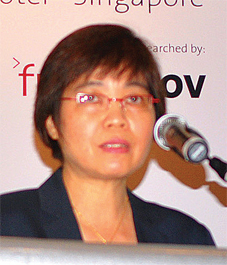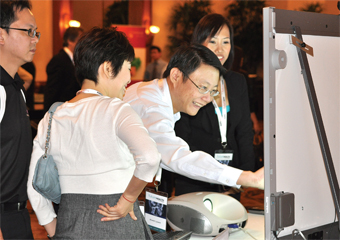
The head of IT for Singapore's healthcare institutions has revealed the lessons she has learned in implementing new projects. Speaking at the FutureHealth Forum-organised by FutureGov Magazine-on May 9, 2010 in Singapore, Dr. Chong Yoke Sin, CEO of Integrated Health Information Systems, said that patient safety is the most powerful argument to get buy-in from clinicians. "We are fortunate, here in Singapore, to have had strong clinician leadership in the adoption of new technology," said Dr. Chong. "But it took us a long time to get where we are. Making cost savings and productivity gains is, of course, essential to getting buy-in for a project. But it is when they [clinicians] see patient safety results that they will truly embrace new technology." According to Dr. Chong, "Choosing the right approach is also critical. For phased projects that are rolled out in stages, you have more time to steward the project, but you must be clear to stakeholders that implementation takes longer too. For 'big bang' projects, communication with users is essential, and their expectations must be carefully managed. For this reason, a change management element must be woven into the project from the start, and the right people selected. The Chief Medical Information Officer should champion the project, but the clinical and business users should drive it, with a small group of three or four with an intimate knowledge of the institution workflows to steer it. These people are critical to the success of the project." "Hospital CIOs must ensure that failing projects are ditched-and quickly," asserted Dr. Chong. "While the benefits of an IT initiative should be demonstrably made in terms of patient safety and improvements in health to maintain the momentum of the health IT journey, you need to be bold enough to throw away a project that isn't working." Dr. Chong also highlighted the big challenges facing Singapore's healthcare sector. By 2030, Singapore will be-after Japan-the world's "oldest" country with 27.4% of the population over the age of 65. Hong Kong will also be in the table of the world's oldest countries along with Germany and Italy. "Life expectancy rises with increasing per capita total health expenditure, but there are diminishing returns," she said. "The highest levels of per capita health expenditure are associated with only modest or no improvements in life expectancy. We can only do so much to prolong life."Some countries, she pointed out, have achieved high levels of life expectancy despite relatively lower per capita health expenditures. In Singapore, where USD 1,150 is spent per person annually on healthcare, the average life expectancy is 73 years old. In the Netherlands, where USD 4,200 is spent per person, life expectancy is the same. Similarly, while life expectancy in both Thailand and the Philippines is 62 years old, Thailand spends more than double that of the Philippines on healthcare (USD 136 per person compared to USD 63).

"Healthcare for ageing populations is becoming increasingly important," said Dr. Chong. "We need to take a proactive approach to tackling chronic diseases that will become more pronounced in the future. To do this, we should not be talking about healthcare IT, we need to be talking about health IT. People need information on how to lead healthier lives. All of us should be participating in the future of health." FutureHealth Forum 2010 was organised by FutureGov Magazine, Asia's only regional public sector modernisation title-focused on improving the governance, efficiency and service levels of government, education and healthcare organisations in the region. The key topics discussed were Health Information System, Electronic Medical Records, Hospital Workflows and Mobile Solutions. Besides Dr. Chong, other top-level expertNike Jordan Superfly 2017

 iConnectHub
iConnectHub
 Login/Register
Login/Register Supplier Login
Supplier Login



























